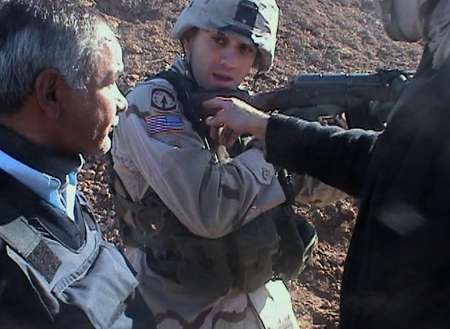FILM-FORWARD.COMReviews of Recent Independent, Foreign, & Documentary Films in Theaters and DVD/Home Video
Directed by: Deborah Scranton. Produced by: Robert May & Steve James. Camera: Zack Bazzi, Michael Moriarty, Stephen Pink, Duncan Domey & Brandon Wilkins. Edited by: Steve James & Leslie Simmer. Music by: Norman Arnold. Released by: SenArt Films & Scranton/Lacy Films. Country of Origin: USA. 97 min. Not Rated.
Mechanic Mike Moriarty, 34, signed up and wanted to serve in Iraq as a response to 9/11. Stephen Pink, a 24-year-old carpenter, admits his decision “to accomplish something” was rash, while university student Zack Bazzi, also 24, felt it was a natural instinct for him to join the guard. A Shiite Muslim born in Lebanon, Bazzi is the most articulate and cynical of the three, and not only because he reads The Nation. He picks up on the racist overtones of his colleagues. According to him, there has been zero training about Iraqi culture, and “Hajji” (for the religious Hajj to Mecca) has replaced “gook” as the epithet of choice. All three serve the same unit, where one of its duties is protecting the military supply convoys. In not holding back in what they say or videotape, none of the men easily fit into any category, political or otherwise. More incendiary than Michael Moore, Pink jabs at defense contractor Kellog, Brown & Root, a subsidiary of Halliburton (and thus indirectly Vice President Dick Cheney, formerly of that company), pointing out that the government pays KBR to provide food to the military at $28 a plate: “The priority of KBR making money outweighs safety.” He declares the US is involved in Iraq for money and oil, while Bazzi mockingly asserts America is bringing democracy and vegetation to Iraq as he videotapes a septic tank spewing out human waste off the side of the road. Adding fuel to Pink’s argument, he also captures on tape the aftermath of a KBR transport vehicle hit by an IED, an improvised explosive device, driven by a third country national – an immigrant laborer taking what has to be one of the most perilous jobs in the country. (But without even a windshield to protect the driver from such attacks, the vehicle was already in bad shape.) Moriarty, after returning home to rural New Hampshire, is glad he went to Iraq, but hated it there, vowing not to go back. But Bazzi, who feels the only bad thing about the army is that you can’t pick your war, doesn’t conform to what you might expect. The men’s complicated outlook has more depth than last year’s Gunner Palace, which was skin deep in comparison and padded with too many rapping service men. And it carries more weight than Michael Moore’s broadsides when you consider the source, an insider’s point of view. And more so than in Gunner Palace, the Iraqis are actually more of a presence here, from the boys who greet and follow the American soldiers to the porn hawkers by the road.
Kent Turner
|

 As a chronicle of the war in Iraq, so far The War Tapes has no equal in candor or in its access to the front lines. Three national guardsmen, all from New England, shot 800 hours of footage during their year of service in the Sunni Triangle with digital video cameras given to them by the filmmakers.
As a chronicle of the war in Iraq, so far The War Tapes has no equal in candor or in its access to the front lines. Three national guardsmen, all from New England, shot 800 hours of footage during their year of service in the Sunni Triangle with digital video cameras given to them by the filmmakers.